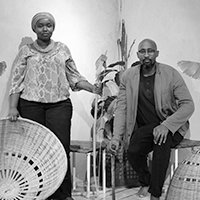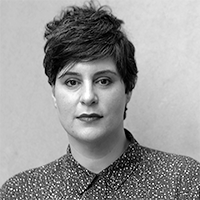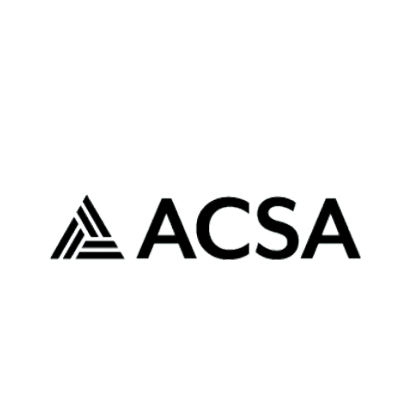June 24-25, 2021 | Virtual Conference
2021 ACSA/EAAE Teachers Conference
Curriculum for Climate Agency: Design (in)Action
Curriculum for Climate Agency: Design (In)Action
This year’s Teachers Conference will be held virtually from June 24 – 25, 2021. The virtual conference will be a forum for dialogue & debate on Curriculum for Climate Agency: Design (in)Action.
The Association of Collegiate Schools of Architecture (ACSA) and the European Association for Architectural Education (EAAE) are pleased to announce the second biennial joint Teachers Conference dedicated dedicated to Curriculum for Climate Agency: Design (in)Action.
Conference Overview
Not all 1.5°C global heating scenarios are created equal. From the current ecogenocide of the global south to the 2020 Gini Index of global inequality, the climate crisis is an urgent one of development, equity and justice. The construction industry is responsible for 40% of global carbon emissions and architecture and other design professions have willingly, or unwillingly, sided with an uneven development that has consequences expanding from food insecurity and nutrient deficiency to imposed displacement due to collapsing ecosystems. Countries and communities that are least responsible are feeling the impact of the decisions made on the opposite side of the world ‐ a trend which will exacerbate in the future as new portions of our shared earth industrialize. As we move out of our current global health emergency and confront the next very real crisis of climate alteration, should architecture’s agenda be to rally forth in action, or can architecture construct a new type of agency in the processes of inaction? It could be argued that inaction in one field can allow for new actions to be taken in other fields and disciplines. The international lockdown, brought forth by our shared global pandemic, has allowed us to witness the effects of a pause on carbon emissions – how do we use this opportunity to not return to business as usual, but instead inform a new normal of climate order? As design educators, we must think critically about the role that the next generation of global architects will play in addressing the inequalities to which architecture as a profession contributes. Our considerations need to range across the atomization of all of our material acts ‐ at the scale of the detail, material specification, building form as well as the design of cities and regions. It is imperative that we as professional educators recognize our epoch of the anthropocene and act as agents on behalf of the globe and its citizens.
Consequently, it has become the principal responsibility of architectural education to generate the new pedagogies and paradigms needed to better equip the profession to confront the climate crisis. We, as cross continental educators, must collectively address our global emergency as well as the opportunity to circumvent architectures’ role in perpetuating it. These pedagogies require deconstruction of architecture’s master narratives as much as a ground‐up envisioning of its future. In order to change the course of architecture’s curricula, we must re‐assemble our core values by asking critical questions concerning our future contributions to our climate. What will we study – which policies, ecologies, histories, materials, theories and social movements will pave the way forward and what ontologies will we leave behind? How will we study ‐ how will our existing tools, techniques, and knowledge gained from successful social, political and philosophical movements aid in our ability to decrease architecture’s impact? Where will we study ‐ in digital classrooms or in living labs that extend from earth’s water and hard crust to the atmosphere? With whom will we study ‐ how can the design disciplines invite more fields, disciplines, genders, races and ethnicities to join us at the design table towards the creation of spatial justice?
The June 2021 Teacher’s Conference, Curriculum for Climate Agency, as a collaboration between the EAAE + ACSA, welcomes a range of formats for presentation and communication, from full‐paper and project-based presentations, to workshop‐based interactions, to graphic, visual and/or textual analyses of projects that respond to the 10 scholarship themes.
Steering Committee
Harriet Harriss
Pratt Institute
Ole Gustavsen
Oslo School of Architecture and Design
Jonathan A. Scelsa
Pratt Institute
Jørgen Johan Tandberg
Oslo School of Architecture and Design
Johan De Walsche
European Association for Architectural Education Council
Michael Monti
Association of Collegiate Schools of Architecture
Scientific Track Committee
Tulay Atak
Pratt Institute
Reese Campbell
Pratt Institute
Leonel Ponce
Pratt Institute
Vicki Weiner
Pratt Institute
Audrey Schultz
Pratt Institute
Ariane Lourie Harrison
Pratt Institute
Janike Kampevold Larsen
Oslo School of Architecture and Design
Luis Callejas
Oslo School of Architecture and Design
Marianne Skjulhaug
Oslo School of Architecture and Design
Håkan Edelhold
Oslo School of Architecture and Design
Tine Hegli
Oslo School of Architecture and Design
Sabine Muller
Oslo School of Architecture and Design
Scientific Reviews Committee
Elisa Cattaneo
Politecnico Milano
Lisa Maria Enzenhofer
Graz University of Technology
Christina Geros
Royal College of Art
Rania Ghosn
Massachusetts Institute of Technology
Karin Helms
Oslo School of Architecture and Design
Lydia Kallipoliti
The Cooper Union
Mae Ling Lokko
Rensselaer Polytechnic Institute
Jennifer Telesca
Pratt Institute
Climate Agency in Practice
The construction industry is responsible for 40% of global carbon emissions and architecture and other design professions have willingly, or unwillingly, sided with an uneven development that has consequences expanding from food insecurity and nutrient deficiency to imposed displacement due to collapsing ecosystems. Countries and communities that are least responsible are feeling the impact of the decisions made on the opposite side of the world ‐ a trend which will exacerbate in the future as new portions of our shared earth industrialize. As we move out of our current global health emergency and confront the next very real crisis of climate alteration, should architecture’s agenda be to rally forth in action, or can architecture construct a new type of agency in the processes of inaction?

Introduction: Ole Gustavsen
Oslo School of Architecture and Design
Bio
Ole Gustavsen
Rector, The Oslo School of Architecture and Design
Ole Gustavsen is an Oslo-based architect and designer, since 2014 Rector of the Oslo School of Architecture and Design (AHO) and current Rector of Nordic Academy of Architecture, a network of all the Nordic and Baltic Schools of Architecture. He joined Snøhetta in 1994 and was appointed Managing Director in 1996 and led the day-to-day operations for the entire office for 13 years. He has been one of the key voices promoting the unique and diverse working methodologies at Snøhetta and also one of key drivers in the office related to research and development projects. He is current a member of the board of directors in the company.

Moderator: Elisa Cattaneo
Politecnico di Milano & Politecnico di Torino
Bio
Elisa Cristiana Cattaneo
Adj. Prof. of Landscape Design, Politecnico di Torino, Politecnico di Milano
Visiting Scholar, Massachusetts Institute of Technology
Visiting Scholar, Graduate School of Design, Harvard University
Founder of O-n_ Experiments in Weakness Theory
Co-Founder and Director of B.L.U.E. Building Landscape Urbanism
Elisa Cristiana Cattaneo researches experimental ecological design and its theoretical implications. In particular, considering the design as a “weak” field evolvable and renewable through new transdisciplinary approaches, in particular between art and science.
She is founder and director of an independent research agency Weakcircus, active in studies, research, and project development in contemporary design within the Theory of Weakness.
In 2009, she completed a PhD in Architectural and Urban Design. In 2010, she was Visiting Scholar at the Massachusetts Institute of Technology. In 2011-2012, she was Visiting Scholar at the Graduate School of Design, Harvard University.
In this line of import-export researches, she recognized Landscape as the last step of the sequence Space – Place – Context (Loaded Void. City Theories since 1956, Maggioli Publisher). Research has found an outcome in monographs of excellent figures, in particular in Andrea Branzi (Andrea Branzi: E=mc2. The Project in the Age of relativity, Actar Publisher, 2019), which highlighted the importance of the North American criticism on the figure of the Italian artist/designer in relation to Nature and the city.
In 2015, she was co-curator of the session Landscape and the City at the Expo 2015 Architecture Pavilion six-months programme Milan, Capital of the Modern, by Regione Lombardia and Triennale di Milano, hosted in the Grattacielo Pirelli, Milan.
In 2019, she was co-editor of the book Prato Fabbrica Natura, and co-curator of the exhibition Verde Prato (Pecci Museum for the Contemporary Art).
She was co-founder with Richard Ingersoll of Terraviva and Earth Service program for ecological and agricultural developing in urban contexts. She is co-founder and co-director of B.L.U.E., international platform of research on landscape as new strategy for contemporary cities.
She is adj. professor of Landscape Architecture at the Politecnico di Torino and Milan.
Since 2002, she has been the principal of her firm, active in public projects and international competitions.

Philippe Rahm
Philippe Rahm architectes
Bio
Philippe Rahm
Principal, Philippe Rahm architectes
Philippe Rahm (born in 1967) is a swiss architect (M.Arch EPFL, Ecole Polytechnique F.d.rale de Lausanne in 1993 and Ph.D University of Paris-Saclay in 2019), principal in the office of “Philippe Rahm architectes”, based in Paris, France. His work, which extends the field of architecture from the physiological to the meteorological, has received an international audience in the context of sustainability. He has taught architecture design at the GSD, Harvard University, USA, from 2014 to 2016. In 2002, Mr. Rahm was chosen to represent Switzerland at the 8th Architecture Biennale in Venice, and was one of the 25 Manifesto’s Architects of Aaron Betsky’s 2008 Architectural Venice Biennale. He participates in 2017 at the Architecture Biennales of Chicago and Seoul. His recent work includes the first prize for the Farini competition in Milan in 2019, a masterplan for a 62 hectares new district and a 15 hectares park, the First Prize in 2011 for the 70 hectares Taichung Gateway Park (Jade Eco Park / Central Park) in Taiwan, completed in 2020, the First Prize for the 1800 m2 Agora of the French National Radio in Paris, a 2700 m2 Exhibition architecture for the Luma Foundation in Arles, France. Monographic books “Environ(ne)ment: Approaches for Tomorrow”, published by Skira in 2006, “Architecture m.t.orologique” published by Archibooks in 2009, “Constructed atmospheres” published by Postmedia, Milan, Italy, in 2014 and “Form follows Climate” published by OFL in 2017, “Le Jardin M.t.orologique” published by B2 in France. He has received the Silver Medal of the French Academy of Architecture in 2019 and was made a knight of the Order of Cultural Merit of Monaco in 2017. He has participated in a number of exhibitions worldwide (SF-MoMA 2001; Centre Pompidou, Paris, 2003-2006 and 2007; Louisiana museum, Denmark, 2009; Guggenheim Museum, New-York 2010, Maxxi, Rome 2014). In 2007, he had a personal exhibition at the Canadian Centre for Architecture in Montreal and in 2018 at the San Francisco Art Institute. Mr. Rahm was a resident at the Villa Medici in Rome (2000). He has held professorships at the AA School in London (2005-2006), Mendrisio Academy of Architecture in Switzerland (2004 – 2005), ETH Lausanne (2006 – 2007), School of Architecture of the Royal Danish Academy of Fine Arts of Copenhagen (2009-2010), in Oslo at the AHO (2010-2011), at Columbia University (2016) and currently at Cornell University. From 2010 to 2012, he held the Jean Labatut Professorship in Princeton University, USA. He is currently a tenured associate professor at the National Superior School of Architecture in Versailles, France (ENSA-V). He has lectured widely, including at Yale, Beijing Forum, UCLA and the ETH Zürich. In 2020, he is the curator and author of the exhibition and book “Natural History of Architecture” at the Pavillon de l’Arsenal in Paris.

Kotchakorn Voraakham
Landprocess and Porous City Network
Bio
Kotchakorn Vorrakhom
CEO and Founder of Landprocess and Porous City Network
Kotchakorn Voraakhom is a landscape architect from Thailand who works on building productive green public space that tackles climate change in urban dense areas and climate-vulnerable communities.
Opened in 2017, Chulalongkorn Centenary Park is the first critical piece of green infrastructure in Bangkok to reduce urban flood risk. With on-site water management, the park can collect, treat, and hold up to one million gallons of water, alleviating overwhelmed public sewage during heavy rainfall. In 2019, Thammasat Urban Rooftop Farm, Asia’s largest, was opened. Landprocess repurposed wasted rooftop space to address food and water scarcity in preparation for future climate challenges. In 2020, Chao Phraya Sky Park was realized. Once an inaccessible and incomplete sky railway, the old ruins are now whole, becoming the first realized bridge park to cross a river in any capital city in the world.
Voraakhom is featured in 2019, TIME 100 Next, a list from TIME Magazine —that spotlights 100 rising stars who are shaping the future of the world. She is also on the list of 15 women fighting against climate change from TIME. This year she was named BBC100 Women, the Green 30 for 2020 by Bloomberg. Recently, she got an award from United Nations as Winners of the 2020 UN Global Climate Action Awards, Women for Results. Voraakhom is a Chairwoman of the Climate Change Working Group of the International Federation of Landscape Architects (IFLA World), TED Fellow, Echoing Green Climate Fellow, Atlantic Fellow. She received her master’s in landscape architecture from Harvard University’s Graduate School of Design.
Image Credit: Fee – Gloria Groenemeyer

Stella Mutegi & Kabage Karanja
Cave_Bureau
Bio
Cave_bureau
Stella Mutegi & Kabage Karanja
Cave_bureau is a Nairobi-based bureau of architects and researchers charting explorations into architecture and urbanism within nature. Our work addresses and works to decode both anthropological and geological contexts of the postcolonial African city, explored through drawing, storytelling, construction, and the curation of performative events of resistance. The bureau is driven to develop systems and structures that improve the human condition, without negatively impacting the natural environment and social fabric of communities. By conducting playful and intensive research studies into caves within and around Nairobi, we aim to navigate a return to the limitless curiosity of our early ancestors while confronting the challenges of contemporary rural and urban living.
Kabage Karanja is an architect and spelunker. He founded Cave_bureau in 2014 alongside Stella Mutegi. A natural environment enthusiast, he leads the bureau’s geological and anthropological investigations into architecture and nature, which includes orchestrating expeditions and surveys into caves within the Great Rift Valley. He is a serial sketcher and storyteller, driven to script and communicate cave thinking in relation to both built and natural environments. Recent exhibitions of Cave_bureau’s work include: 17th International Architecture Exhibition, Venice 2021; The World Around Summit, Guggenheim Museum, 2021; Cooper Hewitt Design Triennial, 2019-20; London Festival of Architecture, 2018. Karanja lives and works in Nairobi.
Stella Mutegi is an architect and spelunker. She founded Cave_bureau in 2014 alongside Kabage Karanja. She is known in the bureau as the problem slayer of all design issues, heading up the technical department and orchestrating the seamless coordination of ideas into built form. She partakes in all Cave_bureau expeditions and surveys into caves within the Great Rift Valley, later steering those geological and anthropological investigations towards a unique architectural product. Recent exhibitions of Cave_bureau’s work include: 17th International Architecture Exhibition, Venice 2021; The World Around Summit, Guggenheim Museum, 2021; Cooper Hewitt Design Triennial, 2019-20; London Festival of Architecture, 2018. Mutegi lives and works in Nairobi.
Curriculum for Climate Action
We, as cross continental educators, must collectively address our global emergency as well as the opportunity to circumvent architectures’ role in perpetuating it. These pedagogies require deconstruction of architecture’s master narratives as much as a ground‐up envisioning of its future. In order to change the course of architecture’s curricula, we must re‐assemble our core values by asking critical questions concerning our future contributions to our climate.

Introductions: Harriet Harriss
Pratt Institute
Bio
Harriet Harriss
Pratt Institute, Dean of the School of Architecture
Dr. Harriet Harriss (RIBA, ARB, Assoc. AIA, Ph.D., PFHEA, FRSA) is a qualified architect and Dean of the Pratt School of Architecture in Brooklyn, New York. Prior to this, she led the Architecture Research Programs at the Royal College of Art in London. Her teaching, research, and writing focus upon pioneering new pedagogic models for design education, and for widening participation in architecture to ensure it remains as diverse as the society it seeks to serve. Dean Harriss has won various awards including a Brookes Teaching Fellowship, a Higher Education Academy Internationalisation Award, a Churchill Fellowship, two Santander Fellowships, two Diawa awards, and a NESTA (National Endowment for Science Technology and Art) Pioneer Award. Dean Harriss was awarded a Clore Fellowship for cultural leadership (2016-17) and elected to the European Association of Architectural Education Council in summer 2017. Dean Harriss’ public consultancy roles include writing national construction curriculum for the UK government’s Department for Education and international program validations and pedagogy design and development internationally. Across both academe and industry, Dean Harriss has spoken across a range of media channels (from the BBC to TEDx) on the wider issues facing the built environment, is a recognized advocate for design education and was nominated by Dezeen as a champion for women in architecture and design in 2019.

Moderator: Rania Ghosn
Massachusetts Institute of Technology
Bio
Rania Ghosn
Associate Professor of Architecture and Urbanism, Massachusetts Institute of Technology
Principal, DESIGN EARTH
Rania Ghosn associate professor of architecture and urbanism at MIT and is founding partner of DESIGN EARTH with El Hadi Jazairy. Their practice deploys the speculative architectural project to make public the climate crisis. The work of Design Earth has been exhibited internationally at venues such as the Venice Architecture Biennale, Matadero Madrid, SFMOMA, MAAT Lisbon, Triennale di Milano, Guangdong Times Museum, Oslo Architecture Triennale, Seoul Biennale of Architecture and Urbanism; and is in the permanent collection of the Museum of Modern Art in New York. Design Earth is recipient of the Architectural League Prize for Young Architects + Designers, ACSA Faculty Design Awards, Boghossian Foundation Prize, and other honors. Ghosn is editor of New Geographies 2: Landscapes of Energy (2009) and co-author of Geographies of Trash (2015), Geostories: Another Architecture for the Environment (2nd ed. 2020) and The Planet After Geoengineering (forthcoming). She holds a Bachelor of Architecture from American University of Beirut, a Master of Geography from University College London, and a Doctor of Design from the Harvard Graduate School of Design.

Kiel Moe
McGill University
Bio
Kiel Moe
McGill University
Kiel Moe is a practicing architect and the Gerald Sheff Professor in Architecture at McGill University. In recognition of his design and research endeavors, he was awarded a Fulbright Distinguished Chair in Helsinki; the Gorham P. Stevens Rome Prize in Architecture at the American Academy in Rome, and the Architecture League of New York Prize.

Albena Yaneva
University of Manchester, UK
Bio
Albena Yaneva
Professor of Architectural Theory, University of Manchester
Head of MARG, Manchester Urban Institute
Albena Yaneva is Professor of Architectural Theory and director of the Manchester Architecture Research Group (MARG) at the Manchester Urban Institute. She has been Visiting Professor at Princeton School of Architecture and Parsons, New School. She held the prestigious Lise Meitner Visiting Chair in Architecture at the University of Lund, Sweden (2017-2019). She is the author of several books: The Making of a Building (2009), Made by the OMA: An Ethnography of Design (2009), Mapping Controversies in Architecture (2012), Five Ways to Make Architecture Political. An Introduction to the Politics of Design Practice (2017), Crafting History: Archiving and the Quest for Architectural Legacy (2020), The New Architecture of Science: Learning from Graphene (2020), co-authored with Sir Kostya S. Novoselov, and Bruno Latour for Architects (Routledge 2021). Her work has been translated into German, Italian, Spanish, French, Portuguese, Thai, Polish, Turkish and Japanese. Yaneva is the recipient of the RIBA President’s award for outstanding research (2010).
Questions
Michelle Sturges
Conferences Manager
202-785-2324
msturges@acsa-arch.org
Eric W. Ellis
Senior Director of Operations and Programs
202-785-2324
eellis@acsa-arch.org

 Study Architecture
Study Architecture  ProPEL
ProPEL 






